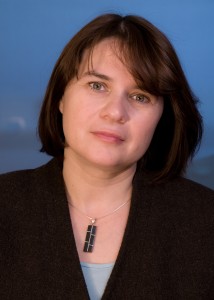When Arabela Grigorescu was a post-doctoral fellow researching DNA repair proteins at the University of Chicago, she found herself a crossroads in her career. Though she was most comfortable in what she considered to be the creative and stimulating environment of academe, Arabela knew teaching courses as a tenure track faculty was not the path she wanted to pursue.
Not having a clear idea of what to do next, Arabela reflected on her graduate school teaching experiences. While she earned her Ph.D. in Molecular Biophysics and Structural Biology from the University of Pittsburgh, Arabela loved teaching labs. She helped design and taught a laboratory course in Molecular Biophysics to familiarize undergraduate students with biophysical techniques to characterize several aspects of protein structure and function. The course was instrumental in teaching undergraduates how to “do” science like it is actually done in the research environment. For Arabela it was a great learning opportunity and a “very rewarding experience,” especially because some of her students were so inspired that they went on to pursue graduate studies in the same area of research.
Today Arabela continues to support researchers as the Managing Director of the Keck Biophysics Facility at Northwestern University. The Keck Facility is a center for molecular biophysical research which provides Northwestern groups with advanced equipment, specialized training, and assistance. The Facility has a set of 22 advanced instruments that allow for integrated analyses of macromolecular structure, interactions, and function. As Director, Arabela manages the daily operations of the Keck laboratory and provides counseling, training and assistance to researchers who need to employ biophysical techniques. She must also constantly evaluate novel technologies and both seek out and supply the Facility with technologies to meet the needs of Northwestern research groups.
Originally from Romania, Arabela studied physics at the University of Bucharest. She turned from physics to biology when Peter Lipke, a biology professor at CUNY, accepted her as non-degree student into his advanced structural biology course. Though she could barely speak English, the course left her spellbound. “After the first couple of lectures I had no doubt this is the area I wanted to specialize in,” Arabela says. She developed her investigatory skills as a graduate student with Linda Jen Jacobson at the University of Pittsburgh and then as a post-doctoral fellow with Phoebe Rice at the University of Chicago – two women who, in Arabela’s words, are “renowned scientists, excellent mentors, and role models.”
At Northwestern, Arabela is a mentor in her own right. Along with her staff, Arabela guides the efforts of over 500 users from various areas of research, all of whom require differing levels of assistance – some are self-sufficient and some need help at every step. However, these challenges do not faze Arabela, “I think it is fantastic to work in this field, in a top-tier research university, in this day and age. I get to see innovative projects, discuss breakthrough ideas, and meet brilliant people every day. It is an honor and a privilege to contribute in a very small way to the extraordinary research currently going on at Northwestern.”
Grateful for the work-life balance she has in her current position; Arabela makes it a priority to be home for family dinner and to spend time with her children. In her spare time, she enjoys gardening and says that readers would be surprised to know that she is pursuing a degree in Garden Design. Thinking back on her career path thus far, Arabela is “very content” in her current position and cannot imagine herself somewhere else. She advises scientists who enjoy academia, but do not want to be principal investigators to sample different aspects of the academic experience during their graduate and postdoctoral years. “It is possible to find rewarding positions that combine managerial and administrative skills with knowledge of the academic system and expertise in a particular area of science. “

